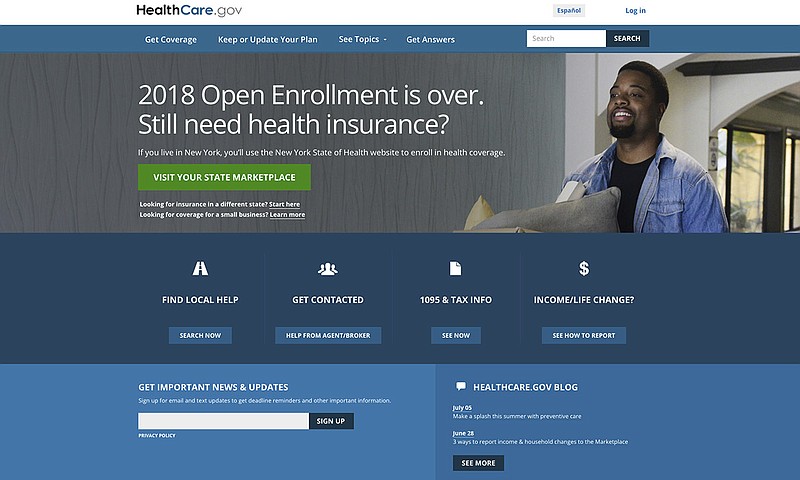While President Trump and his Republican allies have so far not succeeded in their efforts to repeal the Affordable Care Act, or so-called "Obamacare," the new tax law adopted by the GOP-controlled Congress in late 2017 did eliminate the individual mandate - or the "Obamacare tax penalty" for not having health insurance.
One important caveat: The penalty is only repealed in tax years 2019 and beyond. If you didn't maintain qualifying health coverage throughout 2018, you still may face the penalty when you file your tax return in 2019. The penalty for not having health insurance in 2018 is the greater of $695 or 2.5 percent of household income.
Marketplace plans in Tennessee
Five health insurers are offering a variety of individual health plans in Tennessee, but the options differ in each major market.› Chattanooga: Ambetter, BlueCross BlueShield of Tennessee› Knoxville: BlueCross BlueShield of Tennessee, Cigna, Bright Health› Nashville: Bright Health, Oscar Health, Cigna› Tri-Cities: BlueCross BlueShield of Tennessee, Cigna› Memphis: Bright Health, Ambetter, Cigna, Oscar HealthSource: Tennessee Department of Commerce and Insurance
Taxpayers without health insurance can apply for a hardship exemption if they live in an area where they can't find an an affordable marketplace plan that doesn't cover abortion or they experience "personal circumstances" that make it difficult for them to buy a marketplace plan, including not being able to find a plan in their area that gives them access to specialty care they need.
Although the individual mandate for buying health insurance was dropped this year, financial advisors still recommend persons buy some level of health insurance if they are not otherwise covered by their employer or a government plan such as Medicare for the elderly or Tenncare for low-income Tennesseans. Those without insurance often have to pay higher rates for medical services and are vulnerable to losing much or all of their income and holdings in the event of a costly accident or illness.
Obamacare still provides subsidies to help individuals up to 400 percent of the poverty rate to buy health insurance. Even without the mandate, the number of Tennesseans who enrolled in individual health plans under ObamaCare declined only 3 percent for 2019 compared with a year ago, according to the Centers for Medicare and Medicaid Services.
A surge of persons signing up for so-called ObamaCare plans in the final week of open enrollment this month pushed individual enrollment under Obamacare plans in Tennessee to 223,320, or 7,173 fewer than the previous year. About one of every 30 residents in Tennessee signed up for individual coverage in one of the individual plans offered by five health insurance companies in Tennessee for those who don't have health insurance through any employer, Medicare, VA or Tenncare plan.
With more than 60,000 additional Tennesseans on the job compared with a year ago and more retirees in the state getting Medicare, the drop in Obamacare enrollment shouldn't have much impact on the share of uninsured persons in Tennessee.
Those signing up for individual coverage this year benefited by lower rates from the biggest insurers, including Chattanooga-based BlueCross BlueShield of Tennessee - the state's biggest insurer - which cut its rates by an average of 14.9 percent for 2019, with premiums for differing individual plans ranging from $175 to $2,971 per month. Cigna Healthcare, the state's second biggest health insurer, cut its rates for next year by an average of 12.9 percent, with premiums ranging from $243 to $2,966 per month for different individual plans.
In addition to cutting the individual mandate to buy insurance, the Trump administration also cut at least $26 million, or 70 percent of the funding, from a key Affordable Care Act outreach program that helps people sign up for health insurance. CMMS still provided $10 million for the "navigator" program for outreach organizations in 34 states that use the federal marketplace.
"We were happy to see the final numbers coming in close to similar numbers as last year," says Bobby Huffaker, CEO of American Exchange, an online insurance broker in Chattanooga. "With a historically low unemployment rate and the funding for advertising and navigator and assisters being slashed dramatically by the Trump administration, the federal and state marketplaces have become a place individuals and families continue to rely on to gain access to healthcare in America. It provides protection to many that would be unable to seek care without the creation of the state and federal marketplaces, especially those with pre-existing conditions."
Jaycee Wooley, executive director of the Tennessee Health Care Coalition - a nonprofit group that has supported Obamacare - said Tennessee attracted more health insurers into the individual market this year and "that is going to be a good thing for these communities with more competition and more choices.
"We still want Tennessee to join with what other states have done to expand coverage through Medicaid," she said. "But we think these new additions to the market are encouraging and show that despite all of the challenges, ACA (the Affordable Care Act) is still working and needed in our state."
